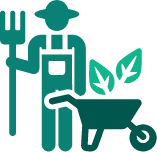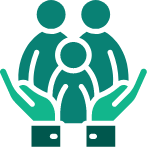Materiality Analysis and Stakeholder Engagement
To ensure continuous and up-to-date improvement in its sustainability performance, Thai Wah has developed a thorough and comprehensive process for conducting sustainability materiality analysis according to the GRI standards. It starts off with understanding our organization’s context by collaborating with stakeholders to analyze internal and external factors from economic, social, and environmental perspectives, followed by identifying the actual and potential sustainability issues and assessing the significance of the impacts, and culminates in prioritizing the most significant sustainability risks and communicating the results to stakeholders in order to ensure their inclusiveness throughout the process. The results of our sustainability materiality analysis are also used to develop response plans to address the most significant risks accordingly, monitor their progress and take corrective action as needed.
| Sustainability Issues | Impact | Sustainability Development Goals (SDGs) |
|---|---|---|
| Good Corporate Governance | Farmer, Associate, Partner and Supplier, Shareholder and Investor | 16, 17 |
| Anti-Corruption | Associate, Customer and Consumer, Partner and Supplier, Shareholder and Investor | 16, 17 |
| Supply Chain Traceability and Sustainable Procurement | Farmer, Partner and Supplier | 12 |
| Technology Adaptation | Associate, Partner and Supplier | 9 |
| Sustainability Issues | Impact | Sustainability Development Goals (SDGs) |
|---|---|---|
| Soil Health | Farmer | 15 |
| Biodiversity | Farmer | 15 |
| Pesticide Use | Farmer, Partner and Supplier, Customer and Consumer | 15 |
| Economic Inclusion | Farmer, Government Agency and Social Enterprise | 1, 2, 3 |
| Sustainability Issues | Impact | Sustainability Development Goals (SDGs) |
|---|---|---|
| Climate Adaptation and Resilience | Customer and Consumer, Shareholder and Investor, Government Agency and Social Enterprise | 13, 14, 15 |
| Emission | Customer and Consumer, Shareholder and Investor, Government Agency and Social Enterprise | 13, 14, 15 |
| Water Management | Farmer, Community and Society | 6, 11, 12 |
| Waste Management | Farmer, Community and Society | 11, 12, 13 |
| Occupational Health and Safety | Associate, Partner and Supplier, Community and Society | 3, 4, 8 |
| Local Communities | Associate, Partner and Supplier, Community and Society | 11 |
| Sustainability Issues | Impact | Sustainability Development Goals (SDGs) |
|---|---|---|
| Human Resource Development | Associate | 3, 8 |
| Human Rights and Labor Practices | Associate, Partner and Supplier, Customer and Consumer, Government Agency and Social Enterprise | 5, 8, 10 |
| Sustainability Issues | Impact | Sustainability Development Goals (SDGs) |
|---|---|---|
| Food Security | Customer and Consumer, Shareholder and Investor, Government Agency and Social Enterprise | 3, 9 |
| Product Safety and Quality | Partner and Supplier, Customer and Consumer, Shareholder and Investor | 3, 12 |

Participatory Channels
- Thai Wah Farmers Network
- Farmer Development Initiative
- Mobile Application
- Thank You Farmer Day
Needs or Expectations Issues
- Better farmers' quality of life
- Fair price
- Technology and innovation for farmers
Company Responses
- Organizing farmer training programs to improve their farm management, entrepreneurship, and cultivation skills
- Conducting all transactions at a reasonable market rate
- Supplying farming equipment to increase convenience, reduce reliability on labor, and save time
- Deploying the Agronomist teams regionally to partner with farmers as trusted advisors
For more details, please refer to the chapters "Farmer Development"

Participatory Channels
- Partner Meeting
- Partner Visiting
- Social Media Channels, such as Website, Facebook, Youtube, Linkedin, and Line@
Needs or Expectations Issues
- Better partners' quality of life
- Sales promotions and marketing initiatives
- Food quality and safety
- Activities to support small scale customers
Company Responses
- Organizing training programs for business partners to increase sales
- Developing a variety of products to meet the market needs
- Developing sales promotions and marketing initiatives to meet the market needs
For more details, please refer to the chapter "Enhancing Quality and Food Safety"

Participatory Channels
- Customer Satisfaction Survey
- Customer Complaint Center
- Social Media Channels, such as Website, Facebook, Youtube, Linkedin, and Line@
Needs or Expectations Issues
- Access to healthy food and good nutrition
- Food quality and safety
- Food innovation
- Responsible marketing and clear labeling
- Clarity and progress in driving the organization towards sustainability
Company Responses
- Building awareness and understanding of nutrition and functional ingredients with consumers
- Increasing communication channels for sales promotions, for both online and offline
- Developing products that comply with global food quality and safety standards
- Offering alternative healthy products
- Developing sales promotions and marketing initiatives that meet the global customer demands
For more details, please refer to the chapters "Food and Finished Goods"

Participatory Channels
- Associate Engagement Survey
- Town Hall
- Annual Performance Review
- Application and platform "My Thai Wah"
- Application and platform "SHE"
Needs or Expectations Issues
- Safety and Occupational Health
- Career Path Development Program
- Payment, Benefit, and Welfare
- Associate Engagement
Company Responses
- Developing the Performance Management System (PMS) to assess associates' performance in order to identify areas for improvement and formulate feasible plans for those improvements
- Developing the Thai Wah Leadership Academy (TLA) and organizing training programs for associates at all levels
- Improving the system for evaluating work behaviors so that it is compatible with current practice
For more details, please refer to the chapter "Safety and Occupational Health" and "Human Resources Development"

Participatory Channels
- Community Relationship Activities
- Complaint Center
- Community Visiting
Needs or Expectations Issues
- Job creation and community economic development
- Manage activities that have an impact on quality of life
- Lowered environmental impact to the communities
Company Responses
- Establishing clear policies for energy and waste management
- Communicating with communities through representative and via Line or phone call
For more details, please refer to the chapter "Farmer Development" and "Green Factory and Community"

Participatory Channels
- Annual General Meeting (AGM)
- Analyst Meeting
- Exclusive Interview
- Company Website, Email, and Phone Call
Needs or Expectations Issues
- Good corporate governance
- Transparent, accurate and timely information disclosure
- Initiatives and progress towards sustainability
Company Responses
- Implementing good corporate governance principles
- Ensuring that shareholders are treated with transparency and equity
- Establishing clear guidelines to disclosure of information on risk management strategies to stakeholders and investors
For more details, please refer to the chapter "Good Corporate Governance"

Participatory Channels
- Annual Report and Sustainability Report
- Collaborations and projects on relevant issues
- Participation in relevant events
Needs or Expectations Issues
- Compliance with relevant laws and regulations
- Good corporate governance
- Anti-corruption
Company Responses
- Operating business in accordance with relevant laws and regulations
- Supporting government projects on relevant issues
- Disclosing information on greenhouse gas emissions and developing efficient solution strategies
For more details, please refer to at the chapter "Good Corporate Governance"